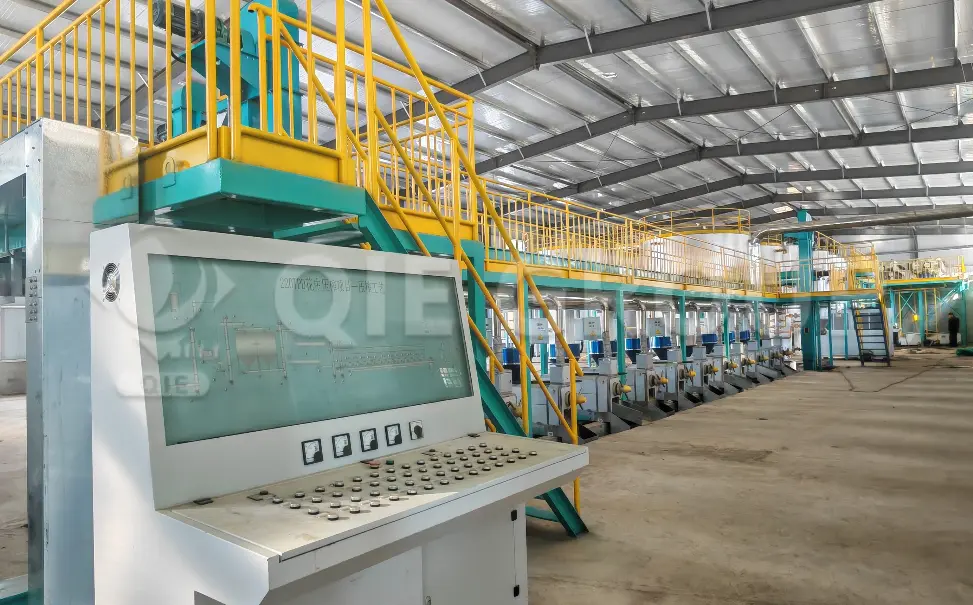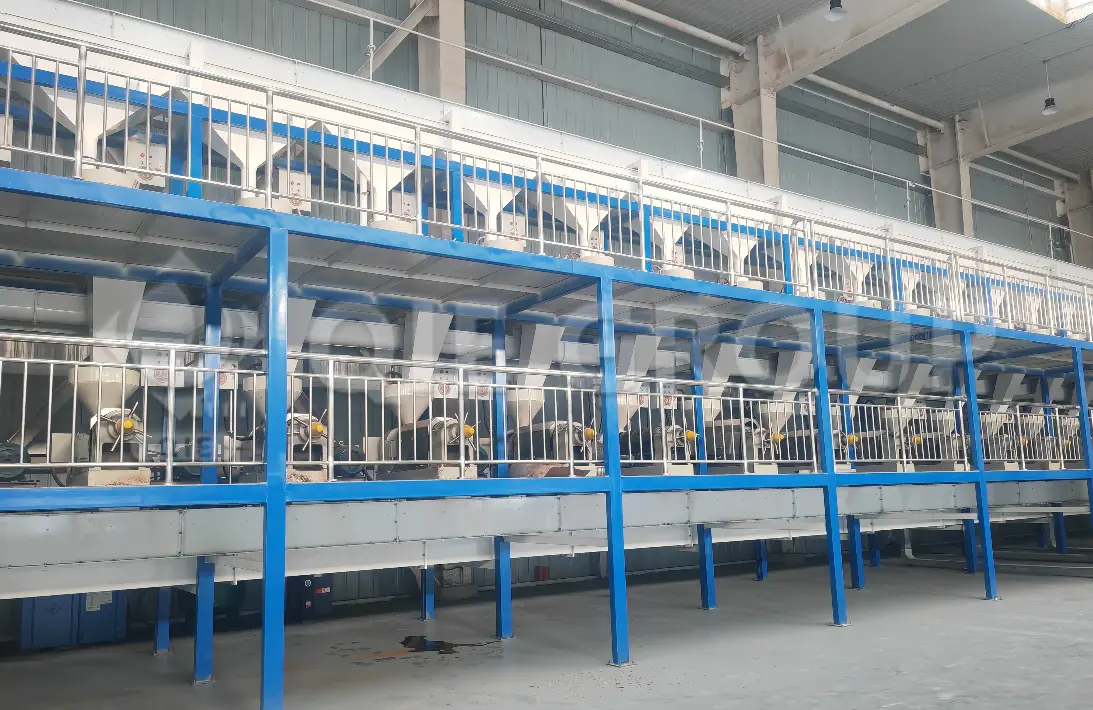When it comes to peanut oil extraction, many people's first thought is oil yield, which is indeed the most direct economic indicator. However, as a manufacturer with over forty years of experience in the oilseed processing machinery industry, we are more concerned with the stability of oil yield, energy consumption control, and equipment maintenance costs. Especially against the backdrop of continuously growing global demand for high-quality edible oil, traditional workshop-style oil extraction can no longer meet market requirements. Automation, large-scale production, and intelligent manufacturing are becoming standard features of large-scale peanut oil processing plants.
Every year, our QIE Group receives inquiries from clients in Africa, Southeast Asia, and South America, and they almost all revolve around the same question:
How can we extract more and more stable peanut oil with less manpower and lower energy consumption?
The answer is clear—large-scale commercial fully automatic peanut oil presses are currently the most mature and reliable solution.
Many people think that an oil press is simply a machine that "presses oil out of peanuts," but it's much more than that. A modern fully automatic peanut oil press is a complete system that integrates pretreatment, temperature control, pressing, oil residue separation, and automatic monitoring, enabling unmanned continuous production.

Take, for example, a fully automated 50-ton/day (TPD) production line we customized for a Nigerian client:
Don't underestimate this less than 4% increase—based on a peanut oil content of 48% per ton, with 300 days of production per year, it can produce an additional 600-700 tons of peanut oil, resulting in considerable profits.
✅ High oil yield : Optimized spiral pressing section structure and pressure gradient, combined with raw material moisture content controlled at 6% - 8%, maximizes oil release;
✅ Low energy consumption design : The main motor adopts frequency conversion control and automatically adjusts its power according to the load, reducing energy consumption per ton of material by about 12% compared with traditional equipment;
✅ Intelligent control : Equipped with a PLC + touch screen operating system, it can monitor temperature, current, oil output, oil content of residue, etc. in real time, and automatically alarm in case of abnormality.
A complete set of equipment typically includes modules such as an automatic feeder, a screw oil press , a temperature control system, an oil residue separator, and an electrical control cabinet, which can be flexibly configured according to the factory layout.
We provided a complete automated pressing production line for a newly built peanut oil plant in Africa. The client previously had two old-fashioned hydraulic oil pressing lines with a daily output of 20 tons. These lines relied on experienced operators to judge the heat and rhythm by feel, resulting in large fluctuations in oil yield and a residual oil rate as high as 6%-7%.
We customized an automated pressing line for them, equipped with a drum fryer, automatic feeding, two-stage pressing, and an online filtration system. After commissioning, the daily output increased to 60 tons, the residual oil rate was stably controlled within 4.2%, and the oil yield increased by about 4%. At the same time, the number of operators was reduced from 9 to 3, and labor costs decreased by nearly 65%.
The most profound feedback from customers is:
"In the past, we relied on intuition to extract oil; now we rely on data to produce it." Temperature curves, pressure changes, and oil flow rates are all visualized throughout the process, enabling truly data-driven and traceable production.
✅ PLC is not a gimmick, but a key to efficiency: In the Pakistan project, the system records temperature, pressure, and current data for each shift, and immediately alarms if the values deviate from the setpoints. Data-driven operation has reduced downtime due to failures by approximately 80%.
✅ Maintenance costs are drastically reduced: The modular design reduces screw replacement time from 8 hours to 40-60 minutes. A customer from Uzbekistan said, "In the past, downtime would delay shipments, but now even ordinary technicians can quickly maintain it."
✅ Better long-term returns: Taking a 50TPD fully automated line as an example, although the initial investment is about 25% - 30% higher than that of a semi-automatic line, but:

Manufacturing foundation : 14 standardized heavy-duty workshops, more than 100 processing equipment, and pressure vessels are produced by the group itself (with Class I and II qualifications), eliminating the risks of outsourcing;
Technological Accumulation : Collaborating with the College of Grain and Oil Sciences of Henan University of Technology to develop phospholipid extraction technology, and applying oil engineering experience to equipment design; the inner wall of the pressing chamber adopts a patented nano-carburized layer anti-wear structure, which is specially optimized for the high fiber characteristics of peanuts;
Delivery Guarantee : More than just "turnkey," we provide "production support." In the Mexico project, we stationed engineers on-site for three months until the oil yield met the target for 30 consecutive days. Customer feedback: "This is the only supplier we dare to sign a performance guarantee agreement with."
| Q: Can a fully automatic oil press adapt to different varieties of peanuts? | A: Yes. By adjusting the pressing interval, temperature, and feeding speed, it can be adapted to various raw materials such as high oleic acid and large peanuts. |
| Q: What is the acceptable residual oil content? | A: Under the premise that the raw material moisture content is 6%-8% and the pretreatment is sufficient, the residual oil content can be kept stable below 4%. |
| Q: What types of oil mills are suitable for fully automatic oil presses? | A: Ideal for medium to large-sized peanut oil mills with a daily processing capacity of 20 tons or more. For smaller oil mills, we can also provide semi-automatic or segmented automation solutions, allowing customers to gradually upgrade their production lines. |
| Q: Is the equipment difficult to maintain? How often do I need to replace the screw press? | A: Maintenance is very convenient. The equipment adopts a modular design, and key components can be quickly disassembled and assembled. Under normal circumstances, the screw press has a lifespan of 8,000 to 10,000 hours, requiring only regular cleaning and lubrication. |
| Q: How are installation and training services arranged? | A: QIE Group provides one-stop turnkey project services. We can send engineers to the site for installation, commissioning, and operation training to ensure stable equipment operation and achieve the required oil output. |
🔗 Recommended Reading: (What to do about low output from a peanut oil press? Five key reasons and improvement solutions)
Every drop of premium peanut oil comes from reliable equipment and stable processes. QIE Group has been deeply involved in edible oil processing equipment manufacturing for over forty years. From experimental testing to large-scale factory implementation, we help our clients turn "raw materials" into "profits."
If you are preparing for a peanut oil processing project, welcome to consult with our engineers. Let us design a fully automated oil pressing solution tailored to your needs, ensuring that high oil yield and low energy consumption are not just data, but real performance in your factory.
Stop worrying about oil pressing efficiency and cost! Click now to learn about large-scale commercial fully automatic peanut oil presses and usher in a new era of efficient oil pressing!









